Baraka Books vient de lancer la version anglaise de Waswanipi de Jean-Yves Soucy (1945-2017) avec une postface de Romeo Saganash. Lors du lancement en ligne du livre anglais le 15 septembre, Carole Massé, veuve de Jean-Yves, a offert le texte suivant sur l’importance du séjour à la communauté de Waswanipi en 1963. Voici le texte. Vous pouvez lire le texte anglais ici.
 Une facette unique de la diversité humaine
Une facette unique de la diversité humaine
Mon nom est Carole Massé, j’étais l’épouse de Jean-Yves Soucy décédé en octobre 2017. Je veux remercier ici M. Jean Bernier des éditions Boréal d’avoir publié la version originale de Waswanipi. Je veux aussi remercier M. Robin Philpot d’avoir publié la traduction anglaise de l’œuvre dans sa maison d’édition Baraka Books.
Jean-Yves m’a souvent dit que son expérience de garde-feu en 1963, à l’âge de dix-huit ans, l’avait profondément marqué, à cause des découvertes qu’il avait faites cet été-là. Or, il les raconte lui-même dans Waswanipi.
Sa première découverte est celle non seulement d’un monde nouveau, celui des Cris, mais d’une civilisation différente de la sienne, qu’il aime d’emblée. Les mots que l’écrivain utilise pour narrer sa rencontre avec ses deux guides cris, William Saganash et Tommy Gull, sont sans équivoque : joie, rires partagés, connivence. Jean-Yves est curieux, respectueux et il veut tout apprendre. Il leur pose nombre de questions, entre autres sur leur conception du temps, du monde, de la place de l’homme dans l’univers, de même que sur la langue crie. Ses guides lui donnent des réponses inattendues, originales qui le font réfléchir et penser d’une manière nouvelle. Visitant régulièrement le village cri, s’imprégnant de la culture crie, Jean-Yves se sent comme chez lui, écrit-il, en famille. Il perçoit sa propre personne et les Cris comme égaux, parents. Sa première découverte est donc celle d’un peuple différent du sien et pourtant proche de lui, et pour lequel il ressent une profonde amitié.
Sa deuxième découverte a lieu vers la fin de l’été, à l’occasion d’une noce. C’est Jean-Yves et son collègue de travail qui vont acheter de la bière pour la fête, parce que la loi interdit aux «Indiens» d’acheter de l’alcool. Après la noce, il voit les hommes du village ramasser des bouteilles et des capsules au sol, et les immerger ensuite dans le lac. Ils agissent ainsi pour ne pas être pris en faute par des agents de la GRC. À propos de cette scène, Jean-Yves écrit: «Cela me fait mal, y voyant la marque d’une profonde injustice.» À ce moment-là, il prend vraiment conscience que «les Cris, comme les autres peuples premiers, sont des citoyens de seconde zone», écrit-il encore. Et son cri de révolte devant ce fait, il le traduit par des dénonciations des mauvais traitements que les Blancs leur infligent.
Découvrir un autre peuple, le respecter et l’aimer, puis découvrir la flagrante injustice dont il est l’objet, sont ce qui a marqué Jean-Yves adolescent, un Jean-Yves pour qui la justice sociale et l’égalité entre tous les êtres humains seront des préoccupations majeures dans sa vie d’adulte. Et malgré le fait que le monde changeait pour les Autochtones et que ces changements apporteraient des bouleversements à leur mode de vie, Jean-Yves a toujours gardé espoir qu’ils les surmonteraient et atteindraient un jour à cette justice et à cette égalité.
En 2013, en vacances à Baie-Trinité, Jean-Yves croise par hasard une famille innue (deux parents avec quatre enfants) et il s’entretient avec elle. Lorsqu’ils se séparent, il a ces mots sereins et confiants, qui terminent son récit :
«… sous mes yeux, je vois qu’ils réussissent à se réinventer, à se créer de nouveaux repères dans un monde qui a complètement changé pour eux. Et ils le font sans renier ce qu’ils sont : une facette unique de la diversité humaine.»
 Je veux remercier ici M. Roméo Saganash de sa présentation du livre Waswanipi et de sa lecture des extraits de Jean-Yves Soucy. Je veux le remercier aussi de sa très belle postface et des extraits qu’il nous a lus.
Je veux remercier ici M. Roméo Saganash de sa présentation du livre Waswanipi et de sa lecture des extraits de Jean-Yves Soucy. Je veux le remercier aussi de sa très belle postface et des extraits qu’il nous a lus.
Carole Massé
14 septembre 2021
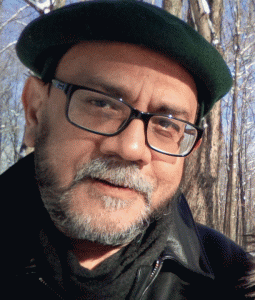 (11 May 2023) Rana Bose left his family and friends yesterday after a long and courageous struggle with cancer. This review of the last book he wrote and presented to the world while already ill was written by Maya Khankhoje, who has given us permission to publish it.*
(11 May 2023) Rana Bose left his family and friends yesterday after a long and courageous struggle with cancer. This review of the last book he wrote and presented to the world while already ill was written by Maya Khankhoje, who has given us permission to publish it.* The ending closes the loop and returns to where the story began, for another generation to take over. It is no coincidence that Rana Bose has dedicated this book—his best in his compact corpus of novels—to Josephine Chameli, Colette Daisy and Fran Amiya, not merely as an affectionate gesture from a doting grandfather to his young grandchildren, but as a pledge—and a token of faith—for them not to repeat history.
The ending closes the loop and returns to where the story began, for another generation to take over. It is no coincidence that Rana Bose has dedicated this book—his best in his compact corpus of novels—to Josephine Chameli, Colette Daisy and Fran Amiya, not merely as an affectionate gesture from a doting grandfather to his young grandchildren, but as a pledge—and a token of faith—for them not to repeat history. * Baraka Books will honour Rana Bose in the near future. Rana is the author of four novels including two that Baraka Books is proud to have published, Fog (2019) and Shaf and the Remington (2022).
* Baraka Books will honour Rana Bose in the near future. Rana is the author of four novels including two that Baraka Books is proud to have published, Fog (2019) and Shaf and the Remington (2022).
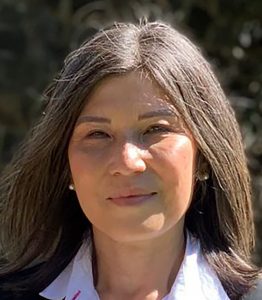 Keep My Memory Safe, Fook Soo Am, The Pagoda
Keep My Memory Safe, Fook Soo Am, The Pagoda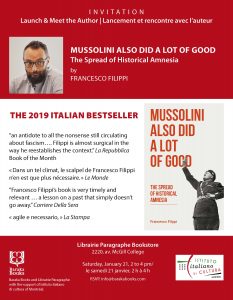 Francesco Filippi, author of the 2019 Italian bestseller
Francesco Filippi, author of the 2019 Italian bestseller 
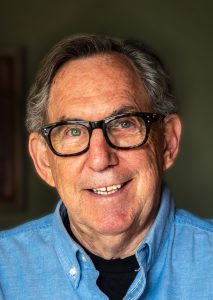 Baraka Books was very sad to learn that Richard King passed away on Jan. 4, 2022. His was a life devoted to books, as bookseller, book reviewer, bookseller and more. He was the author of great mystery novels and biographies. A renowned bookseller, he co-founded Paragraphe Bookstore in Montreal and held the position of President of the Canadian Booksellers Association. His regular books column at CBC was appreciated by authors, publishers and listeners because his comments and suggestions were always sharp, enlightening, witty and inspiring.
Baraka Books was very sad to learn that Richard King passed away on Jan. 4, 2022. His was a life devoted to books, as bookseller, book reviewer, bookseller and more. He was the author of great mystery novels and biographies. A renowned bookseller, he co-founded Paragraphe Bookstore in Montreal and held the position of President of the Canadian Booksellers Association. His regular books column at CBC was appreciated by authors, publishers and listeners because his comments and suggestions were always sharp, enlightening, witty and inspiring. Une facette unique de la diversité humaine
Une facette unique de la diversité humaine Je veux remercier ici M. Roméo Saganash de sa présentation du livre Waswanipi et de sa lecture des extraits de Jean-Yves Soucy. Je veux le remercier aussi de sa très belle postface et des extraits qu’il nous a lus.
Je veux remercier ici M. Roméo Saganash de sa présentation du livre Waswanipi et de sa lecture des extraits de Jean-Yves Soucy. Je veux le remercier aussi de sa très belle postface et des extraits qu’il nous a lus.





 Baraka Books is very sad to learn that Jacques Lacoursière, historian, writer, speaker and popularizer of history for all generations, passed away at the age of 89.
Baraka Books is very sad to learn that Jacques Lacoursière, historian, writer, speaker and popularizer of history for all generations, passed away at the age of 89.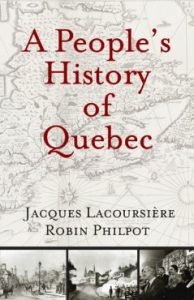 Publisher Robin Philpot translated it from the French and adapted it for English-speaking North American readers, with a number of additions. Jacques Lacoursière insisted that he be co-author of the book.
Publisher Robin Philpot translated it from the French and adapted it for English-speaking North American readers, with a number of additions. Jacques Lacoursière insisted that he be co-author of the book.

Facebook